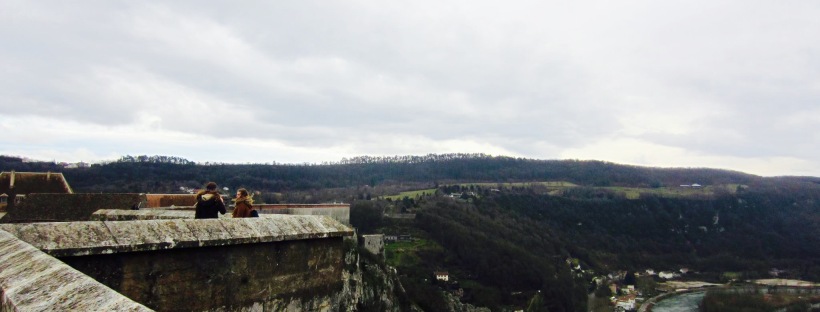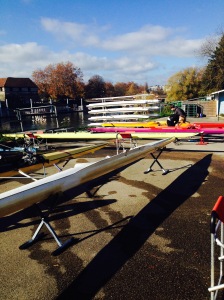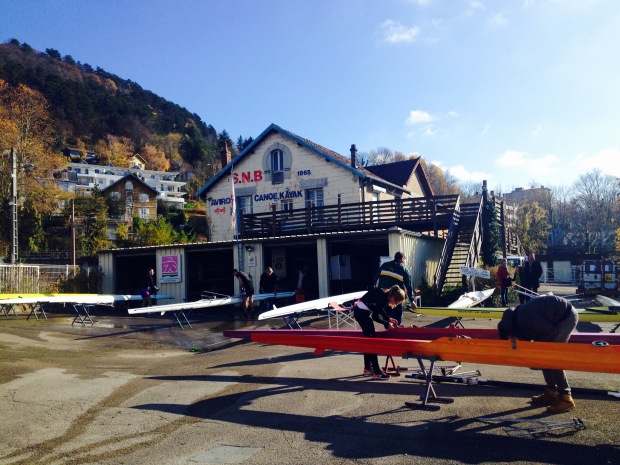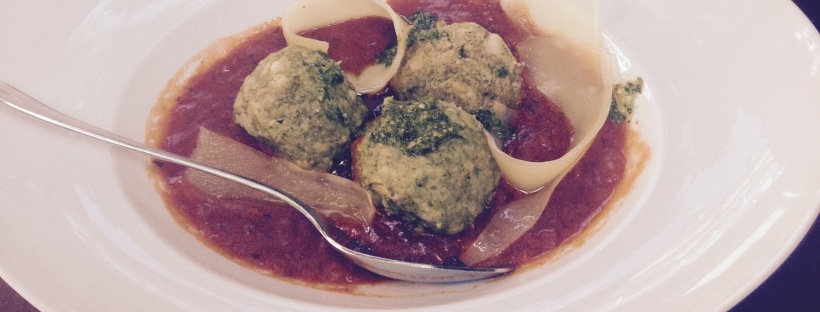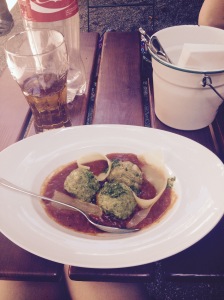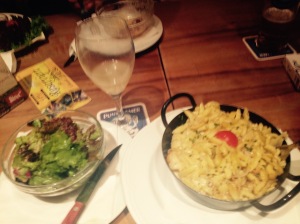Servus!
hello / goodbye
This greeting originates from the latin for slave/servant and literally means something like “I am your servant”, but that’s about all I can tell you. There doesn’t really seem to be any rule about who uses it but I tend to use it when I meet someone for the first time / shake someones hand just to mix things up.
Servus language learners (sorry friends and family, you may find this one a little less interesting)!
MEINe ZEIT IST FAST VORBEI
MY TIME IS NEARLY UP/OVER
Useful phrase of obvious reasons, which includes the very-hard-to-grasp “vorbei.”
I only have one week left in Graz , so thought it would be a good idea to record some of the things I’ve picked up along the way. Hopefully it will help me realise how much I’ve learnt subconsciously!
WAHNSINN!
CRAZY!
So the literal meaning of this one is madness or insanity, but it’s also used in conversational language to mean either “wow that’s crazy!” or “mad / crazy / ridiculous” along with a tut or a shake of the head.
Where has the time gone? Wahnsinn!
JEMANDEm UM EINEn GEFALLEN BITTEN
TO ASK SOMEONE A FAVOUR
Weirdly useful phrase, especially at work. So easy to forget the preposition though so Vorsicht!
Kann jemand mir einen Gefallen tun? Remind me to reread this before heading to Germany to give me a bit of a confidence boost!
ICH ÜBERLEGE MIR
I’LL HAVE A THINK, I’LL THINK IT OVER
Can also mean something alone the lines of ‘let me just have a think’ which is great when you have no idea what to say.
Ich habe mir überlegt, and here are some useful words and phrases that I’ve picked up over the last two months…
ICH GLAUB(E) SCHON.
I THINK SO.
Obviously very useful. Currently in a very bad umgangsprachliche habit of shortening all of my verbs (e.g. ich glaub schon), which isn’t going to do me any favours in an oral exam but means I can talk much faster.
Working in a translation company involves getting asked tricky questions about English grammar. There is no doubting the fact that my ability to analyse my own language has improved dramatically! But replying with“ich glaub schon” gives me a bit of time to quickly google!
ICH MELDE MICH
I’LL BE IN TOUCH, I’LL MESSAGE YOU
I always used to get this one confused and say “melde mich” when I wanted someone to message me. Led to a few awkward misunderstandings as it actually means the exact opposite!
One less obvious advantage of language exchanges / tandems is chatting with people via Facebook, Whatsapp etc to arrange meet ups. My phone’s inability to quickly swap between languages means that it’s often more hassle to write in English (to the extend that I even message a couple of friends from home in German). Although often annoying, it forces me to practise writing, with no time to check vocab in a dictionary, and pick up a few useful phrases along the way. So to all my German-speaking friends out there, ich melde mich okay.
ES ist mir wurst!
It’s sausage to me!
I love this phrase, and okay, yes, it doesn’t mean “it’s sausage to me” other than in literal terms. A stronger, more colloquial form of es ist mir egal, it actually means anything ranging from “I don’t mind” to “I couldn’t care less” depending on tone of voice and context. Feel free to but as much emphasis on voorrrssssht (Wurst) as you like.
Tandem partner to indecisive Katie: Do you want to go for ice cream or smoothies? Es ist mir Wurst! Normally we end up doing both of course.
ICH BIN DABEI!
I’M IN, COUNT ME IN!
Dabei is another one of those love-hate words that means literally everything… thereby, in the process, although, as a result, in doing so.
I learnt this one through the rowing Whatsapp group “Bachstelzen” (wagtails). A rowing Whatsapp group might sound pretty tame, but its literally like code. Dialect, slang, abbreviations. And about fifty people reading my messages. So my standard keen contribution is “ich bin dabei!“
Geil
CoOl… But not always…
Vorsicht! This might be a word that you hear all the time (especially if your ‘brushing up on your Umgangssprache’ by watching Germany’s Next Top Model), but it can also mean “horny.” Proceed with caution.
Yesterday was Aufsteirern – voll geil! Blog post coming shortly!
Anstrengend
exhausting, stressful, arduous, hard, tiring, challenging, trying, wearisome, wearing,taxing, punishing, grueling, straining
Thanks linguee for all these definitions. Normally, when a dictionary kindly provides me with far too many translations of one single word, I groan inwardly. Anstrengend, however, is useful because it has so many meanings. Can’t think of a negative adjective? Just use anstrengend!
Whilst anstrengend is a useful word, I did already know what it meant so it’s a bit of a cheat. Blöd, however, was a new one. Meaning anything from stupid to silly to dumb, it might not sound like the kind of word you would enjoy using but try it – it’s literally the perfect combination of letters for explaining when something is just down-right annoying.
SÜß
CUTE, SWEET
Pretty sure this is one of the most overused words in my workplace. Another one is lieb, meaning nice, sweet, good and other things along those lines. You can also say “das wäre mir wirklich sehr lieb” which means I would really appreciate that.
Even I have been described as süß, if you can believe that. Of course, it was due to a language mistake. Not knowing the word for Reindeer, I went for Weihnachtspferd (Christmas horse). Voll süß. The actual word for reindeer, oh so simple: Rentier.
Auf Jeden Fall
in every/no case, certainly, for sure!
I’ve always know what this one means, but “in every case” never sounded as if it would be that useful. How wrong was I. This has to be one of the most used German phrases, and, once you stop thinking about it’s literal translation, you can slip it in everywhere. Don’t forget you can also say the opposite: “auf keinen Fall” means definitely not.
Learn this phrase! If anyone asks you if you want to come along, this should always be your answer! It’s true that tagging along to various events can often leave you feeling a bit awkward, and sometimes even bored, but its the best way to meet locals and get practising.
AUFESSEN
EAT UP, FINISH EATING
This phrase stops you from giving the game away that you are English with phrases like “ich bin so voll.” Another option is “ich bin satt”, which is the correct say to way “I’m full!”
If you’ve tried Käsespätzle from my last post, you’ll know how useful it is to be able to say “ich kann es niche aufessen!”
NA JA….
WELL…
Great one if you need a bit of time to work out what you’ve been said / how you want to reply. Or if you know the sentence you’re about to say involves some complex grammar.
Isn’t that enough vocab Katie? Na ja…. just a few more….
EBENFALLS!
Same to you! you too! ditto!
Phrases such as “schönen Tag noch!” (enjoy the rest of your day!) und “schönes Wochenende!” (have a nice weekend!) are pretty easy to get the hang of, but how do you reply to them? Here’s your answer. Ebenfalls seems to be much more common than ebenso so give it a try.
Anyone out there struggle talking to cashiers, waiters, bus drivers etc? Ebenfalls! It’s partly the dialect and partly the speed but phrases like this make it a bit less awkward.
ES GEHT SICH AUS
österreichisch umgangssprachlich für es reicht, passt (Duden)
If any one can think of a good translation for this let me know. It’s pretty hard to explain out of context but this is a colloquial phrase which can relate to both time and space. The examples I was given at work include if you’re running for the bus and you’re not sure if es geht sich aus i.e. whether you’ll make it in time, or if you find a parking space that is pretty small but just big enough for your car, then es geht sich aus! Likewise, if your Christmas tree is almost too tall to fit in your sitting room and there’s a tiny gap between the tree and the ceiling you can say, yay es geht sich aus!
When planning my year abroad, I didn’t have much time to fit everything, but luckily my placement in Graz, es geht sich aus!
ES ZAHLT SICH NICHT!
IT’S NOT WORTH IT!
Austrian colloquial version of es lohnt sich nicht.
My other worry was that a two month placement zahlt sich nicht. How wrong was I. I’ve improved so much that I almost regret not working abroad earlier. I do, however, feel like I’m about to hit another barrier and that the next hurdle will be a bit trickier to overcome. So maybe its a good thing I’m moving on to a new challenge!
WENN ALLES KLAPPT
IF THINGS WORK OUT, GOES WeLL, GOES TO PLAN
Once you start using the klappen, you will wonder how you ever lived without it. Another useful variation is… es hat gut geklappt (it worked out well, went smoothly).
Once sentence to describe my time in Graz: es hat super gut geklappt!
Bis nächstes Mal / Bis zum Nächsten Mal
Until next time!
I use this one in the post office, as I go to most days to post translations. It gives me a great opportunity to test my ‘strong Austrian dialect’ comprehension skills, and I like to think that bis zum nächsten Mal lets them know that I enjoy my daily post office chat/challenge.
Let me know if you have any more additions (or corrections!), and bis zum nächsten Mal!
 y friend studying architecture pointed out that the citadel is a UNESCO World Heritage Site as well as a Monument Historique. It seems strange that a zoo is allowed to be on the site, as this has led to some changes being made to the buildings. I’m sure there are strict regulations that are being followed to a tee, but for me a UNESCO World Heritage Site is not the place for a zoo. Such an impressive building alone merits a visit and the amazing views are a bonus. Unfortunately, I have no intention of supporting the zoo by paying the ticket price again, so I will have to find a new view point to enjoy the surroundings from. At the same time, the citadel is something you can always see, from the river, from the tram, as you walk through town, and when you arrive at the train station. And so it’s something that I’ll always appreciate… from the outside.
y friend studying architecture pointed out that the citadel is a UNESCO World Heritage Site as well as a Monument Historique. It seems strange that a zoo is allowed to be on the site, as this has led to some changes being made to the buildings. I’m sure there are strict regulations that are being followed to a tee, but for me a UNESCO World Heritage Site is not the place for a zoo. Such an impressive building alone merits a visit and the amazing views are a bonus. Unfortunately, I have no intention of supporting the zoo by paying the ticket price again, so I will have to find a new view point to enjoy the surroundings from. At the same time, the citadel is something you can always see, from the river, from the tram, as you walk through town, and when you arrive at the train station. And so it’s something that I’ll always appreciate… from the outside.
